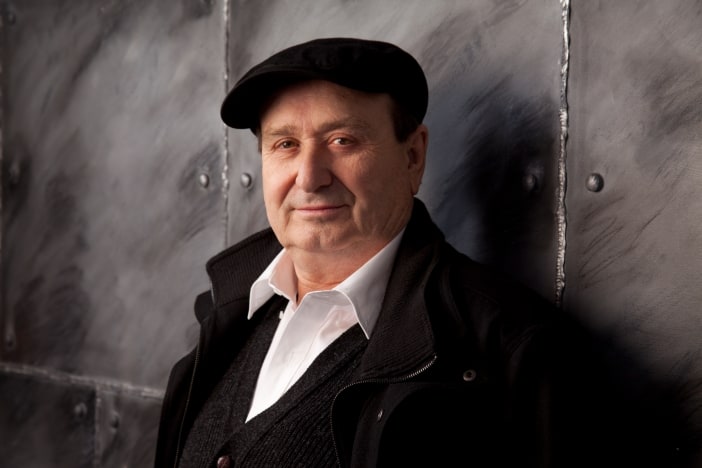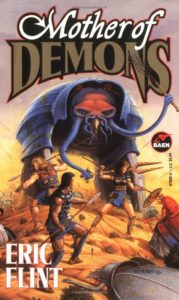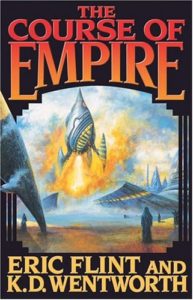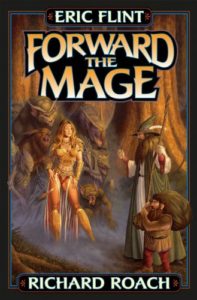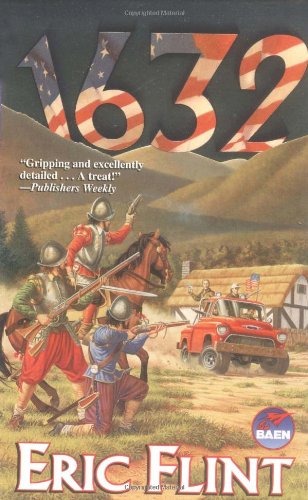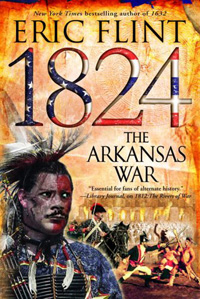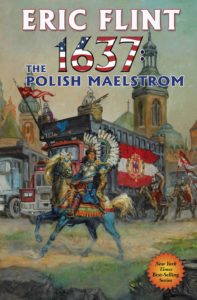Podcast: Play in new window | Download | Embed
Subscribe: Apple Podcasts | Spotify | Amazon Music | Email | TuneIn | RSS | More
An hour-long interview with Griffin Barber, author of Second Chance Angel, co-authored with Kacey Ezell; 1636: Mission to the Mughals, co-authored with Eric Flint, and Man-Eater, Book 3 of the Murphy’s Lawless series, set in Dr. Charles E. Gannon‘s Caine Riordan universe, and several short stories.
Website
www.griffinbarber.com
Facebook
@Griffin911
Twitter
@J_GriffinB
@RantingGriffin
Introduction
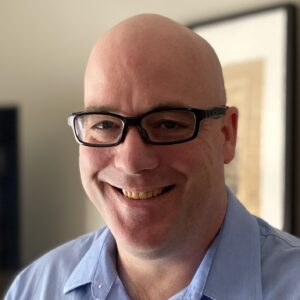
Griffin Barber‘s first novel was 1636: Mission to the Mughals, co-authored with Eric Flint. He’s also the author of the novella Man-Eater, Book 3 of the Murphy’s Lawless series, set in Dr. Charles E. Gannon‘s Caine Riordan universe, and a number of short stories. His latest novel is Second Chance Angel, co-authored with Kacey Ezell, was recently released by Blackstone Publishing.
Griffin spent his youth in four different countries, learning three languages, “and burning all his bridges.” Finally settled in Northern California with a day job as a police officer in a major metropolitan department, he lives the good life with his lovely wife, crazy-smart daughter, and needy dog.
The (Lightly Edited) Tranascript
So, Griffin, welcome to The Worldshapers!
Thanks so much for having me.
I’m glad to have you. I talked to your co-author on Second Chance Angel, which is one of the books we’ll be talking about, Kacey Ezell, just four days ago, I guess just the beginning of this week, maybe just two days ago. Not that that matters to anybody listening because this will go live sometime way down the road. But anyway, I did talk to her very recently and said I’ve been looking forward to talking to you. And I will start the same way I start all of these, by getting you to go back into “the mists of time” and tell me how you got interested in science fiction and fantasy and how you got interested in writing it. So, how did that all work for you? And a little bit about your, you know, general growing up and background.
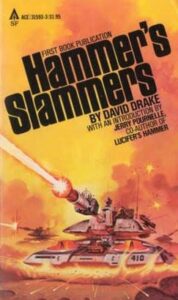
So, my father was an executive with Caterpillar, and when I started reading voraciously . . . first off, I’m dyslexic, so I had a lot of challenges to learning to read and learning to read quickly and especially learning to write manually. And so, I think I was a little bit a late bloomer when it came to reading a lot of stuff. But I discovered very early on and stole from my father’s dresser a copy of The Lord of the Rings and really got into that and enjoyed it quite a bit and started reading a lot of science fiction, mostly hard science fiction, though, you know, specific titles I can’t really recall at this, you know, late day and age, until I got into my teens, when I discovered Pournelle, Dave Drake, that kind of stuff. So, this was the ’80s and, of course, Star Wars, that kind of thing, was available as far as media is concerned. But when it came to reading the stuff, I really enjoyed Hammers’ Slammers and Dave Drake’s work. Jerry Pournelle’s open universe, called War World, was another one that I just thought the world of. And, yeah, so C.J. Cherryh, Elizabeth Moon, Anne McCaffrey, just a ton of . . . I remember going to the library and checking out a lot of the Dragonriders of Pern books as a kid, so, yeah, I had a lot of science fiction influences as a kid.
Did you have friends who are into it as well, or were you kind of the only one that you knew that read this stuff?
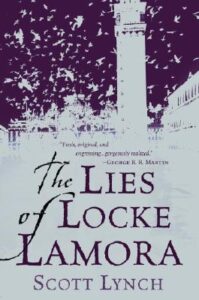
No, actually, I kind of lucked out when I was about 10. One of the kids that moved into my neighborhood in North Carolina, still my friend today, working up in Alaska, Kyle, Kyle moved in, and we discovered that we both like science fiction and fantasy. And he remains a voracious reader and a really good, like, he’ll forward stuff to me that, you know, that he thinks I’ll enjoy, that kind of stuff. But he’s more in the fantasy vein these days as far as reading. So, he’ll give me, you know, like, he was the one . . . I hadn’t heard of The Lies of Locke Lamora, and he’s like, “Dude!” So, he gave that to me to read, and I really did enjoy it.
Yeah, I enjoyed that one a lot, too.
Yeah. And, you know, I’m a big fan of heist movies, you know, huge fan of Lock, Stock and Two Smoking Barrels and pretty much everything Guy Ritchie’s ever put on film as good examples of the heist or the multiple storylines getting tangled up.
So, where did you grow up? Did you grow up and move around, or were you in one place?
Yeah, we moved around quite a bit. I originally started out and I was born in Peoria, Illinois, and went to . . . we moved to Spain and then to Canada and then back to the States when I was, I think, six. And then stayed there until I was 16, at which point we were back in Peoria, Illinois, and then moved from Peoria to Geneva, Switzerland, and stayed there for about six years. I finished up my high school there and went to a bit of college, wasting my dad’s money, failing out from those colleges back in the States, and went back and was working as a bartender in Geneva at a Mexican restaurant’s bar that’s right outside the garre, the train station in Geneva, met my wife there and returned to the States, I guess about a year after that, to Nevada and from thence to California or actually sorry, back to Chicago, which is probably one of my favorite cities in the world, and from Chicago, Oak Park, outside of Chicago, and then off to Northern California, which is where I’ve stayed for the last, jeez, 22 years now.
You did a lot of things in there, but you ended up as a police officer, I see from your bio.
Yep. So, I joined a major metropolitan department here in Northern California, and I’ve been doing that for 20 years as of February last year.
Where did the writing fit in with all of that? When did you really start trying your hand, as a kid or later on?
I wrote a bit as a kid, got into a contest, and won the local one, won the next level up the next year. And then, they didn’t believe I’d written it myself, so they basically said I wasn’t . . . they disqualified me. And I showed them. I didn’t write again for 20 years.
That taught ‘em!
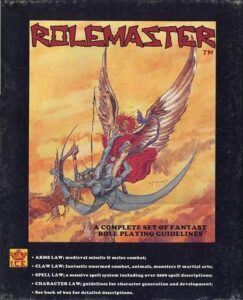
Yeah, exactly. So, then I . . . but in the meantime, I did a lot of roleplaying games. I ran a lot of D&D and Rolemaster, Space Master, Traveler. Pretty much every kind of roleplaying game out there, pen-and-paper roleplaying game out there. I usually read it, liked it, and read it.
I like to say that although theoretically, I majored in journalism at university, at Harding University in Searcy, Arkansas, really, I majored in Dungeons and Dragons and minored in everything else, based on the amount of time I spent on it.
Right. It probably taught you more about stats than the stats class, right?
I probably did. So, what was kind of . . . when you got back into trying to write, what did you start with? And how did that work with you getting into published professionally?
So, I was walking a beat and on my beat was Borderlands Bookstore . . .
Oh, yes.
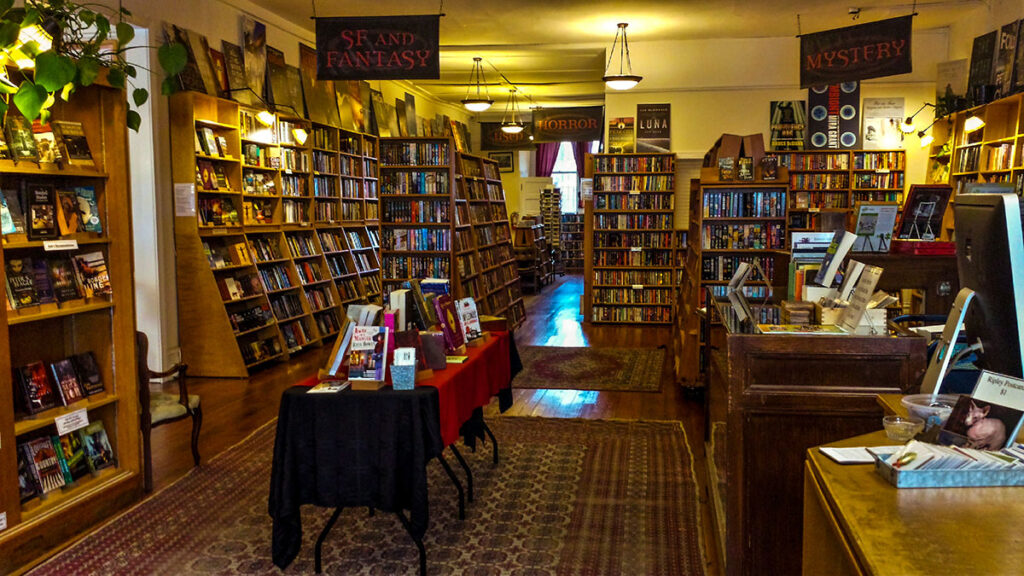
. . . which is one of the premier Northern California bookstores, certainly for science fiction and horror, and hanging out with Alan Beatts, and I’d been talking about how I’d always wanted to write and was trying to finally write because . . . I had a couple of things going on as well. So, attention deficit disorder is a real thing. And I kind of resent people when they talk about, “Oh, I just got the ADD,” or whatever, ADD moment. I was diagnosed with it and finally got some medication for it after I was sitting on the counselor’s couch and blubbering about how I wanted to do all these things and never had. And she said, “Well, you know, there’s some medication you could probably take, and you could, you know, maybe do that.” And a year after that, I had my first novel written.
And so, I’m walking the beat, and I’m talking to different folks at Borderlands and stuff. And I was told by Alan Beatts, the owner there, you know, “Hey, take a look at this.” He said, “Let me take a look at it, and I’ll tell you what I think.” And I was like, “Well, sure.” So, thinking, Wow, that’s pretty cool. And he did. And he said, “This is really good, and you have to send it out.” And he was also really relieved that his beat officer actually wrote well, rather than crappily, and he’d have to let me down easy, given that I was going to be around for a while. So, that novel has been since trunked, but a lot of the work I did on it informed Second Chance Angel. I’ve always been kind of fascinated with A.I., and how do we get like an anthropomorphic A.I. that, you know, feels and talks and seems to behave more in line with humanity without having the natural instinct for survival, et cetera? So, that dealt with that, but there were some other errors and problems with it, and so it got trunked.
Well, you know, you learn to do by doing, as they say.
Exactly. Especially in writing.
When did you make the step up to the next level, then?
And so, I’d been going to . . . as an adjunct to trying to sell that novel, I had been going to World Fantasy because it was really cool. And that’s where my friend Kyle met Scott Lynch, and I’m like, “Who?” And he’s like, “It’s Scott Lynch. Lies of Locke Lamora, you’ve got to read it, it’s an awesome book.” So anyway, we had been going to that for some time and hobnobbing with a lot of these authors that are really neat people, and we attended a panel with Walter Jon Williams and Charles Gannon, Chuck Gannon, and it was on gunpowder and fantasy, I think. And the panel went really well, but there was an individual at the panel who was a little bit abrasive, and Chuck was being hunted by this guy. And Kyle and I kind of intervened to make sure that this guy didn’t harass Chuck much because we wanted to talk to him. And we ended up speaking with Chuck and having a few cocktails at the bar that evening. And he, the next morning he’s, “I read some of your stuff off your blog. And it’s really good, it’s got a very different quality. You need to write for Eric Flint, the 1632 universe.” And the Grantville Gazette was specifically what he was talking about, it was, you know, a good way to get short stories out there, get your name recognized and work with professionals, get the professional credits, et cetera. And it still remains that.
But at the time, I was, you know, like I said earlier, about how I can show people, you know, I know better because I’m not right. I was like, “Oh, you know, I’m not a big fan of time travel, number one. Number two, I’m not a, you know, I’ve got this novel I’m trying to sell.” So, he let it go and let me, you know, but a year later, when I come back to him, to World Fantasy, he’s like, “How’s it going for you?” So, I kind of bit my, you know, swallowed my pride and said, “It’s not going well. We haven’t sold it.” And he’s like, “Oh, they still need people that can tell some stories and synthesize all the history and stuff, and I think you’re, you know, you’d be good at it.” So, I wrote a story, and unlike, you know, it’s unusual in my experience of talking to other authors, that story that I wrote, bank on it sold immediately.
I’ve had both Eric and Chuck on The Worldshapers, so I’ve talked to both of them, and we talked, of course, about the 1632 universe. A lot of authors have kind of made their way in through that particular universe, it seems like.
Yeah, well, there’s a lot of words being written for it. I don’t know how many it’s up to now, I think it might be six or seven million. There’s a lot of words and a lot of different collaborators. And it’s a really neat universe. I enjoy writing in it. It’s the rigor of trying to get historical facts and characters right, combined with being a little creative with “What if?”, you know, that game that we all played as kids, “What if somebody went back and killed Hitler?” and when, and all that kind of stuff, so it’s been fun.
Now we’re going to talk about Second Chance Angel in a little bit. But just to get an idea of your creative process, we’ll take a look at the whole . . . Man-Eater, I guess, is the latest one, the whole series is called . . .
Murphy’s Lawless.
And it’s actually set in the Caine Riordan universe?
Yeah. Which is Chuck Gannon’s universe. I joked that I call Chuck, it’s Chuck “The Rainmaker” Gannon, ‘cause a lot of the opportunities I’ve had, indeed, most of the opportunities I’ve had, aside from Second Chance Angel, although he did introduce me to my agent, everything that has kind of come to me that’s been super-positive has been through Chuck Gannon, so, I owe him a lot.
Well, maybe give us an overview of Murphy’s Lawless and Maneater, specifically, whatever you want to give by way of a synopsis without, you know, giving anything away that you don’t want to give away.
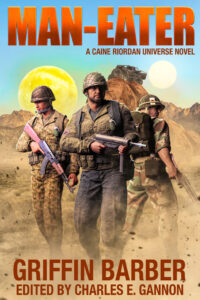
So, in the core books of Chuck’s universe, the Caine Riordan books, he is basically behind enemy lines. And one of the things in his galaxy-spanning war, or our neck of the galaxy, anyway, one of the ongoing deals is this alien race has been kidnapping human soldiers and turning them out for their use. And Caine Riordan has stumbled across a group of those soldiers. They’re put in cryo-sleep for however long, in some cases hundreds of years, and then thawed out when they felt it appropriate. But Caine stumbles across a unit of these folks, or a group of soldiers stolen out of time, and he puts them to use but for their own good, kind of situation. So, it’s very much one of those tropes of soldiers out of time, kind of deal. Murphy’s Lawless is dealing with some of the guys that are a little bit more broken and perhaps not as suitable for frontline action, but they’re struggling to make it happen anyway. The characters that I specifically used were Chalmers and Jackson, they’re a criminal-investigation division from the Mogadishu era when they’re taken, and they are investigating a spy that is working for the bad guys, trying to find someone that is going to report on their troop movements before they can do too much damage.
So, working in someone else’s universe. It’s a little different than when you get to Second Chance Angel, which is something you and Kacey developed. What does that . . . I mean, obviously, there’s not as much worldbuilding involved. Is there a Bible for all of this that you have to follow, or what do you start with?
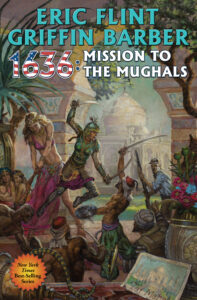
Well, for the 1632 universe, oh my, is there a Bible? There’s, as I said, there’s at least two million words. But the core novels are up to, I think, a million or something like that. It’s huge. So, you don’t necessarily have to know all of that, but it helps. And then because I’m an idiot, I shot my mouth off about India and what was going on there. So, I had to do an enormous amount of research on India, specifically Mughal India, which at the time was Islamic, but Islamic conquerors, Hindu soldiers, very inclusive kind of empire as far as, like, they took talent from wherever talent was, and they paid cash, which nobody did at the time. So, the creative process in that one and that universe is very much constrained by what’s come before and by what is plausible, given the extensive research that you have to do. So, you know, every story is a human story, right? Otherwise, we’re really not telling it. So, in this particular regard, it’s within these constraints trying to tell that human story, make it engaging and make it fun, and maybe make some points that you wanted to make as a human being or writer.
So that’s that universe. And then for Chuck Gannon’s universe, I’ve been lucky enough to be one of his alpha or beta readers for a number of years for the mainline series. So, I had read everything that exists that’s been published for that, and some that hadn’t been published yet. And then, I was kind of part of the initial skull sessions that originated the idea of doing this Murphy’s Lawless sequence and developing that, so I knew . . . I was very familiar with a lot of the background anyway, and then having read . . . he prepared a bible for us that was, I think, 127 pages, as well as a bunch of Pinterest files to kind of show what the imagery that he thought of the planet that they’re on, called R’Bak, which was cool. So . . . and I’m used to, because of my gaming background, I’m very much used to assimilating the gazette, assimilating the “this is the universe, and what’s the story you’re going to tell in that universe,” that kind of thing.
So, how did your planning/outlining process look? Is it a detailed outline for you, or how does that work?
Well, for Man-Eater, not at all, I kind of pantsed that very heavily. Because it’s a novella, it’s pretty short. So, there wasn’t a whole lot I had to do. But for Second Chance Angel and anything that you’re going to do it collaboratively, you’ve got to absolutely make certain that you have an outline that you agreed on because otherwise, things get confusing and, you know, people don’t know where you’re at, that kind of stuff.
So, is that a long, drawn-out process, the two of you going back and forth and deciding how it’s going to be?
Yeah, it’s not . . . I wouldn’t say it’s a long, drawn-out process. One of the cool things I was just able to do that Eric taught, Eric Flint, was a very easy, very simple outlining technique, using Excel or whatever equivalent you need, or Sheets or whatever for Apple. And it’s, the left-hand, left-most column is chapter, the second one is scene, the second column is scene, and then it goes who, what, when, where, and why across. And it’s just one or two sentences. Or it can be as complex as you want it to be. But one or two sentences describing what’s going on in the what, the when is really useful for connecting how, you know, what’s the time frame for everything, and where and why, again, for making sure you know where you’re at in the book and that kind of thing. Really very useful, especially if you’re like me, and you’re not necessarily all that up on actual outlining technique as far as Roman numerals and large capital letters and all that kind of stuff. And the biggest thing I found advantageous about it is that if you change something in the writing, you still want to discover something while you’re writing, you can just go in and change it, and it doesn’t have to affect the huge slew of, you know, the numeral system and everything, how you organized it in that very strict outlining kind of sense.
That’s interesting. I haven’t heard that particular one before. It sounds useful.
Yeah, I found it to be. You know, most people that I, most authors I’ve spoken to, they’re like, “Wow.” Because, you know, if outlining is not intimidating, then cool, but if it is intimidating for you and/or you feel like, “Well, that’s going to constrain me because I’m not going to be able to do al the discovery that I want to do,” well, it’s easy to continue to discover something about the characters, et cetera, and then only have to change one or two lines, or even change a row in the Excel document, so you can kind of keep track of where you turn left and that kind of thing.
So, when you’re working in someone else’s universe, was there an approval process before you went ahead?
Well, Eric and I collaborated on the outline for Mission to the Moghuls very closely. And I basically . . . yes, so the outline is definitely an approval process, and I worked very closely with him to get that squared away. And then, depending on your deal with Eric, as far as how much work he has time for, number one, and number two, also thinks he needs to do for it, he’ll, you know, either weigh in fully and be doing 50 percent of the actual writing, or he’ll do less, depending on those criteria. But the outline is always, with Eric, a very collaborative process.
What does your actual writing process look like? Are you a fast writer or a slow writer? Do you . . . . you know, considering what your job is, I would think that you have to work around things a bit.
Well, I think everybody has their strengths and weaknesses, right? I can write action very, very well, personal combat, I do pretty damn well, and part of that springs from 20 years of experience of writing down what somebody did to somebody else in an incident report, sometimes three and four times a day. So, I have lots of practice with doing that, but I am not necessarily as good at giving you an emotional scene, which for me, it runs counter to my day-job experience. You’re not supposed to put a bunch of emotion into what you’re writing about in an incident report. So, I can . . . it can go really fast, and it can go really, really slow. It really depends on how I’m feeling. But as far as, like, the logistics of it, I was writing . . . I ride a motorcycle on my commute back and forth to work. I had kind of started injuring the tendons in my hand, so typing was miserable, so I started using Dragon Dictation, and that worked pretty well. And I would do, you know, whenever I had an opportunity . . . .one of the things about police work in general, as far as being in the field, is you have ten-hour shifts, but you’re working four tens. So, you work for a few days, and you’ve got a few days off. So, I would ignore my responsibilities as a father and husband and sit down as long as I could and try and crank out some pages. I find it a lot easier to write to a contract than I do to write on spec, which is one of the reasons why Second Chance Angel, I think, really spun out fast for me because . . .the contract wasn’t necessarily for money, it was a contract between Kacey and I as both of us being similarly experienced writers and not wanting to let the other person down on this pet project that we had taken on for ourselves and that we were taking time out from other things that we might be able to do to work with one another. So, it was really important to me, just as a professional, to make sure I didn’t let her down. So, you know, I didn’t care, I was going to crank those letters and those words out that day any time I had an opportunity to work on Second Chance Angel.
Well, since we’re talking about that, and although Kacey gave her synopsis of it, somebody might not have heard that episode and is hearing about it for the first time. So, how would you describe Second Chance Angel?
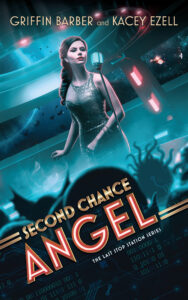
A very noir mystery thriller set in a distant future with aliens and a lot of heart. And a little bit of excitement, too. There’s quite a bit going on, alien crime lords, et cetera. So, we touched on a lot of different stones in the subgenres of science fiction.
Did you alternate chapters or alternate scenes or decide who’s doing which scenes? How was that divided up between you?
So, we . . . it kind of fell naturally to us. I wrote the male Muck parts, and she wrote the Angel parts, the female . . . that sounds kind of vaguely dirty, doesn’t it? Angel parts. She wrote the A.I. Angel. As we closed in on a finish, I started to feel, and Kacey, as well, we started to feel like there was some difficulty with the . . . well, first off, the first-person perspective is a challenge for a full-length modern novel today, because people are expecting to have, you know, 100,000, 200,000 words in their inbox for their novel. We were coming in kind of slow on those numbers and were worried that that would be a problem. And then also, trying to tell the full story from only two perspectives, and they share a body, was a little bit challenging. So, we added in additional characters—characters that were already in, but we added them as a point of view characters. They were A.I.s that are not sentient. They are sophonts, but they’re not sentient. They don’t feel at the beginning of the novel. So, that was told in third person, and because they were administrative A.I.s and law-enforcement, they had a lot more data collection points to use for their point of view. And that was collaboratively written between the two of us.
Once you have a draft, either for yourself or for the collaborative novel, what did the revision process look like? Did you have beta readers or anything like that or not?
Yes, we’re both lucky enough that we have a lot of friends that are also writers and voracious readers. And I sent out . . . there’s a group of guys and gals that I have been, from World Fantasy, mostly . . . that I’ve been associated with for some time. We call ourselves the Breakfast Squad. We just basically hang out, drink too much, and make bad jokes in the mornings after. So, we get everybody up, and at breakfast we make inappropriate humor our métier. So, I sent it out to them, and all of them came back with positive, for the most part, and they had a couple of things that they found problematic, and we fixed those problematic issues and turned around, and I did principal editing, first pass, and then I think Kacey went through it again and then we sent it off to a publisher. That publisher turned us down. And we then went to our agent, Justin Bell at Spectrum Literary, and he turned around and shopped at about.
And it’s being published by . . .?
It’s Blackstone Publishing house who eventually picked it up, and they’ve put it out there, and it’s already out and swimming with the other fishes.
And Murphy’s Lawless, I presume, since it’s Caine Riordan, it’s Baen that publishes that?
No, actually. There’s only so much room in any publisher’s house for different stuff. And Chuck was looking around for places that he could put additional content for the Caine Riordan universe and contacted Chris Kennedy Publishing. And with Toni Weiskopf, the publisher and editor at Baen Books, they worked out a deal. And it’s like, “Yeah, cool, no problem. Go ahead and take this portion of the universe and play.” So, Chris Kennedy Publications did an imprint called Beyond Terra Books, and that’s what has published the Murphy’s Lawless series. So far, it’s only in one season, but they’re going to . . . we’re in the process now working on the second season, and the third season is planned, as well as Lost Signals, which is an anthology of mostly short stories—but it seems like every one of us went over the limit on the words—that was initially Kickstarted and then produced, is going to be republished with Beyond Terra Press. So, we’re excited about that, too.
What was the editorial process like for each of these books once it ended up at the publisher? What sorts of feedback did you get?
So, it’s been very different, depending on who it was with. So, Eric is, you know, he’s such an old hand with the editing of his work with co-authors, he generally tends to edit a lot of stuff upfront and then submit it to Toni and Baen, and they have a copyeditor go through it. But it seemed to me that it was harder to pass Eric for editing than it was to actually pass through to the Baen folks because they have a high degree of trust with him that he is going to furnish good copy and complete copy. When it came to the Murphy’s Lawless, sent it to Chuck, and then he sent it on once he was done editing it, and there were some challenges with the Maneater copy because I was going through, I’d had back surgery recently, and stuff like that, I was changing some of my medications, et cetera, so I was not just as focused as I would have liked to have been while I was writing that, although I do think it turned out really nicely. And Chuck had some editing to do with it and then gave it over to Mia Kleve at the Beyond Terra imprint, Chris Kennedy Publishing, and they turned around and got it out there real quick. With Second Chance Angel, it was . . . Blackstone Publishing hires some freelance writer editors, and they hired Betsy Mitchell.
Oh, right!
Yeah, it was a huge like, “Wow, really?” We were super excited that that was how it turned out. And she was just really great to work with. She made it a much, much better book with her work.
Well, as editors, good editors do. That’s kind of what they’re all about.
It was really, really neat. And I mean, it was neat working with her because she taught us a lot about how to, you know, how to . . . how simple changes in some of the things that we were doing would lead to much better throughput as far as understanding it, what was going on. ’Cause this is a pretty complex novel, too.
And it has some nice reviews, I see, on your website. So, you must have been pleased. Publishers Weekly and well, Eric Flint gave you a good review, and David . . . you mentioned Hammer’s Slammers, and there you have a review from David Drake.
Yeah, I get choked up when I even think about that, because, you know, he’s my idol.
Yes, it’s . . . one of the great things about this field is that you, you know, we all get started, and we read people that inspire us, and the next thing you know, you’re at World Fantasy or somewhere like that, and you’re actually meeting these people that were kind of far-off distant figures, and you find out they’re there, you know, real people that you can actually . . .
Yeah, and they don’t have clay feet, necessarily. They don’t necessarily have clay feet. So, yeah, Dave was . . . I didn’t really . . . I think I read a couple of books by him, Hammer’s Slammers, beforehand, but I got into one of the anthologies when I was living in Switzerland. And, you know . . . we moved there in the summer, so school hadn’t started. So, I had, you know, zero friends for the most part, although there was one or two that I ended up meeting before school started. But, I had a lot of time on my hands and went down to the English language media store, which is called Elm Books, the anagram of their name, and I picked up, I think, The War World and . . . I can’t remember the name of it now, I just wrote about it the other day . . . but by David Drake and you know, to have him, so he was my buddy, he was writing stuff that I really wanted to read, and he was my buddy in my mind as far as narrating life. So, it was really huge for me to eventually meet him again through World Fantasy and Borderlands books. I ended up driving him around San Francisco to look at the Diego Rivera murals and that kind of stuff and just kind of hanging out and being careful not to tell him that, “I just love your work!” or descending into that kind of . . . it’s really hard when a stranger comes up to you and says, “I love you!”, you know, so you don’t want to go there as a fan. And I managed to keep my fanboy in check. And we’ve been buddies ever since. It’s been a real pleasure. And when I, with great temerity and worried about it, when I wrote him to ask him to write, to read it, he not only read it, but he enjoyed it and offered a blurb. A huge deal.
You talked about all the places you’ve lived, and of course, you’ve done lots of things. And then a police officer for the last 20 years. You did mention how working as a police officer has perhaps influenced things a bit. Do you feel that all that experience, that living experience you have, has made you a stronger writer?
Yeah, there’s no doubt in my mind that, you know . . . part of the reason why I joined the department wasn’t just for a regular paycheck, but also, you know, I wanted to have some stories. Experience informs everybody’s work. You can be a great writer and tell some really cool tales as a youngster. But I think that there is a lot to be said for your experience, life experience, and how you process those experiences can inform your work quite a bit. Certainly, for me, I don’t think I had anywhere near the talent to be able to compensate for my lack of experience when I started.
Do you feel you’re improving all the time?
Oh, yeah, definitely. If you stop learning, you’re failing. I feel like it’s . . . everything can teach you quite a bit. And part of the cool thing about collaborative work, too, is that you can learn from your co-authors immensely if you have an open ear to do so.
Are you very different as writers, the two of you?
Yeah, I think that Kacey is magnificent at emotional impact and emotionally impactful scenes. I am much less so. So, I really picked up a few things from her as far as that and then, you know . . . oftentimes when guys try and write romance, it ends up just being a little bit like porn. Or most guys. One of the things I learned from her is that . . . because there’s a strong vein of romance in this, and I think I learned quite a bit about how to portray that without being, you know, physical, being so utterly reliant on physical description.
Well, we’re getting about, right about 10 minutes left here, so we’ll take the big philosophical questions. Why do you do it? Why do you write? Why do you think anybody writes? And why write science fiction and fantasy type stuff specifically?
Number one, specifically, is a lifelong love affair with it, with the genre. You know, it’s the ultimate in anything’s possible. If you can imagine it and make it plausible, you can make it possible in your work. So, that is really cool and unmatched, I think, in any other genre. With regard to why I write, I am a lot healthier when I’m writing and getting my mat out on the page rather than in my interpersonal relationships with others.
One of the things about my profession, especially in recent years and this last year, is that we are expected to be held to a standard that is very, very difficult to adhere to, first off, and secondly, it is extremely difficult when you do adhere to it to not appear as if you’re doing otherwise, because the ignorant or those that are only partially educated in what it is we do will often see something, and violence looks like violence. It looks bad. People don’t go beyond the appearance of things very much in this day and age of “the feels” to understand that the legal justifications and the legal situation that these officers often find themselves in is difficult, and it does not have the benefit of armchair quarterbacking or hindsight. It has to be done right now, in this moment. So, one of the things that the writing allows me to do is to kind of explain that and to work out some of my own feelings about situations that I’ve been in and difficulties that I’ve had on the job and personally.
And why do you think we write, any of us write? Why do you think there’s this impulse to tell stories?
Well, I think it’s one of the ways we relate things that work and things that don’t. And it’s also one of the ways that . . . you know, Dave’s a good example, Dave always talks about getting his mad out and, you know, coming back from Vietnam and not being able to talk about it. And some people find avenues to talk about it through speaking to other veterans or speaking to other people and whatever workplace that they have or, you know, support groups, that kind of thing. And some people need to write about it, and they need to explore their perspectives, that the voices in their own heads are telling them they need to talk to or talk about these things. So, I think it’s always a good thing that storytellers are how we communicate knowledge about the world and how we think it works. And for the storyteller themselves, it’s often a good way to process feelings that are otherwise troublesome.
Well, the podcast is called The Worldshapers, and I always say it’s a little grand to think of any story as particularly shaping the entire world, but certainly, stories can shape individual readers. So, when you’re writing, do you have any hope for how it might affect your readers? When they come away from your stories, what do you hope they take with them?
Well, this particular one, Second Chance Angel, is very important to me that people realize that trauma and dealing with trauma is . . . there are a number of different ways to handle it, and you can be a highly successful individual handling it, processing it and getting it, you know, working on it rather than suppressing it or not trying to think about those kinds of things. There’s a lot of different ways to deal with, to effectively deal with, trauma and issues that arise from trauma that include, rather than preclude, you doing well in your profession and in your relationships with others. So, if there’s anything that I would like people to kind of get is, there’s other people going through the same stuff that need to process it and that there are other people out there in the world that will listen.
And at the same time, I presume you’re hoping to entertain?
Yes. You know, most people are going to look at this and are going to go, “Really? I mean, there’s like there’s a singer on the cover and squiggly alien heads and stuff like that. This guy’s reaching pretty far.” But yes, the ultimate and primary goal is to tell a good story. And along the way, I would like for people to gather or take from it that there’s a lot of ways to heal thyself. And they usually include actually tackling the problem head-on, and they do not preclude getting better at your profession.
What are you working on next?
So Kacey and I just finished the outline and first couple of chapters for The Third Sin, which is the sequel to Second Chance Angel, which has a couple of references there to both the noir genre and a certain robot A.I., a famous guy’s work, certain laws of robotics, and we’re excited to be beginning work on that. I have been working on an epic fantasy for 12 years now, so I’m trying to close in on the finish of that. But I’m also rehabbing from my back injury and trying to get back to work, etc., so there’s quite a bit of stuff going on that’s slowing me down a little bit. But we’re also doing that second season of Murphy’s Lawless, and I’m hoping to have a story in that. I’ve got a bunch of short fiction that has come out in the last year. I’m hoping to get more opportunities to write short stories, as well. So, there’s a lot of different openings.
Is Second Chance Angel seen as a trilogy or endless series, or what’s the idea there?
Yeah, there’s no . . . that was one of the things that is kind of important to note, too, is that one of the things that Jim Baen, the original and the man that built Baen Books, one of the things he said to Eric Flint as related to me by Eric was, the best way to not have a series is to try and write your first novel in that series as if you have a series. So, write a complete story, write a complete novel that indicates that, you know, that it’s discrete, and the reader goes away happy. So, we tried do that with Second Chance Angel. I think we accomplished it. But we are wide open. We have got . . . we did a lot of worldbuilding in Second Chance Angel, and there’s a lot of mystery left to for both Angel and Muck to unravel and fight and suffer through. So, we are very hopeful that we’re going to be able to do a long-running series with it as long as the readers are willing to buy it and publishers want to publish it. We have no specific thing about, like, it’s going to be a five-story arc or a five-novel arc, that kind of thing. But we have the next one outlined, as I said, and we have a precis for the third one, which is tentatively titled The First Question. Because we like to mess with people’s numbering systems.
Yeah, I was just thinking that. The first one is Second Chance Angel, the third one, no, the second one is The Third Sin, and then the fourth . . .
The third one is going to be The First Question, and the fourth, I don’t know, we’re going to have to get creative on that one.
Use a fraction.
Or Four Score, or something like that. But yeah, we had a lot of fun, and we hope that people really enjoy it. It’s my favorite work, I think, so far, because I really got to . . . with Kacey, she and I basically just sat down, and we built a universe, whereas with everything else I’ve done in the past collaboratively, it was done, I was the guy, the journeyman, coming into the master’s arena. So, this was really cool to be masters of our own universe, to be able to just kind of go, “This is really cool to me,” and then hash it out between the two of us as equals rather than as one of us being previously established and the holder of the I.P.
And where can people find you, and more about the book, online?
So griffinbarber.com, and on Facebook as Griffin Barber and Twitter as @TheRantingGriffin and @GriffinBarber as well. Baldilocks is one of the nicknames I’m going with now because I am bald. Yeah, and accessible at any time to chat about stuff. I really enjoyed this, so I appreciate you giving us the opportunity to come on the show and talk about worldbuilding.
Well, you were recommended to me by Dave Butler at Bean Books, who’s been on the show and whom I met at a convention.
Yes, he’s a great guy. I met him, too.
One of the few authors I could truly say I looked up to because I’m 6’2” and he’s . . . more than that.
Yes, he is. He’s a great guy, too. He’s been really neat to get to know.
Yeah. I’ve enjoyed getting to know him a little bit myself. Well, I think that brings us to the end of the podcast. So, thanks so much for being on. I enjoyed that. I hope you did, too.
I did!
All right. Well, bye for now.
Bye for now.

